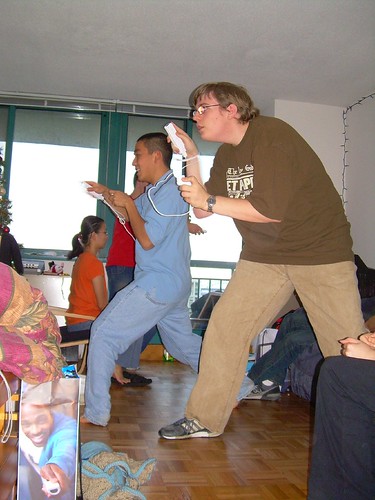A recent vacation opportunity brought to light other clinically relevant uses of the Wii. The Wii can play a motivating role in Health Promotion and Lifestyle Modification across all ages. For many who have a more sedentary lifestyle, the Wii proves to be useful tool in encouraging change. The Wii stimulates those who may usually choose to only watch sports, to get up (or remain seated) and swing the remote at the tennis ball, the golf ball or the baseball. Others swing the remote to bowl or box.
In the school setting, students who might usually shy away from physical education (PE) classes rush to sign up for PE revolving around Wii Sports and other Wii programs. Teachers have found that the students who are reluctant to play team sports are more than willing to get out of their desks for some friendly Wii competition. The students like the feedback Wii provides and are motivated by the improvement that the Wii makes readily visible.
In the clinic setting, the Wii has an application in Health Promotion. Researchers in the area of Fall Prevention (Lachman, M., Howland, J.,& Tennstedt, A.,1998) have identified a sedentary lifestyle as a primary risk factor for falls. In older adults, a sedentary lifestyle and a fear of falling (Edelberg, 2001) often go hand in hand, creating a reciprocal nature among fall risk factors in the elderly population. Using Wii as a therapeutic activity with elders allows the clinician to work towards goals such as increasing standing and activity tolerance, improving dynamic balance and reducing fear and anxiety. The fun nature of Wii along with the built-in reinforcement of improved scores encourages and motivates elders to be more active and engaged in therapy.
Another great therapeutic use of Wii is in Lifestyle Modification Programs. Lifestyle Modification Programs help clients struggling with obesity, type 2 Diabetes, or other chronic conditions to implement changes in daily routines, reducing disease burden. Initially, the Wii gently introduces increased physical activity into the daily schedule. For those participants with a history of computer gaming, the Wii allows them the familiar pleasure of gaming while increasing physical activity. Wii also encourages social interaction and creates opportunity for community building through the creation of bowling leagues and baseball teams.
Exercising in the virtual environment created through the Wii should not be considered a replacement for exercise in the real world, but Wii Gaming can be used effectively to provide additional activity throughout the day. The Wii may help those who are extremely sedentary to take initial steps toward increasing activity. By increasing the level of daily activity, participants may gain strength, endurance and improved balance, leading to improved well-being.
References:
Edelburg, H. (2001). Falls and function: How to prevent falls and injuries in patients with impaired mobility. Geriatrics. 56(3). 41-45.
Lachman, M., Howland, J.,& Tennstedt, A.(1998). Fear of falling and activity restriction: The survey of activities and fear of falling in the elderly (SAFE).Journals of Gerontology: Series B: Psychological Sciences and Social Sciences. 53B(1). 43-50.




